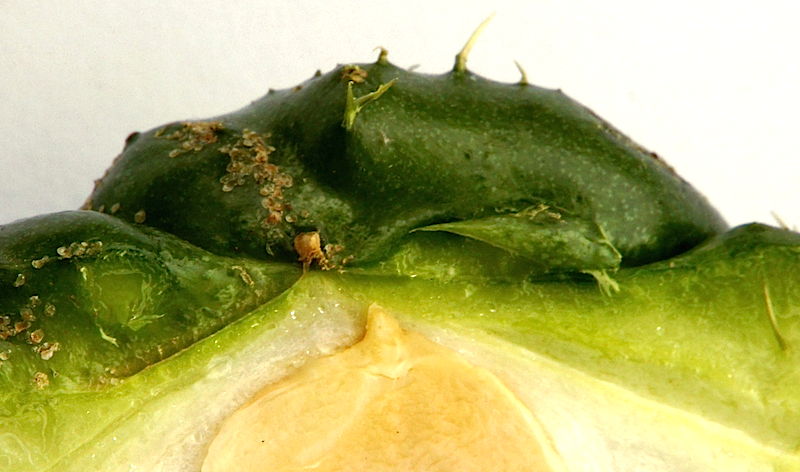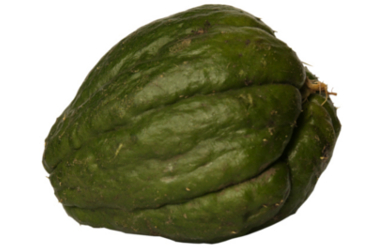
Guatila cortada
Once upon a time, and several times, the guatila was in grandmother’s hands. All green, deformed, smooth, and cold. I look at it in the photo, plunged in its silence in this white background, and silent is the guatila now on the kitchen counter. My grandmother used to make a stew with guatila in, maybe I ate it as a child and if I did I didn’t even notice. In my short childhood memory, memory full of the present, there was only space for onion and tomato, the unforgettable mix which turned my palate.
So, when did the guatila reappear? Or rather, when did it disappear? Why did nobody name it at home, why isn’t it routine for us? And worse still, generalizing: who had the idea of calling it the “poor person’s potato,” when not even poor people eat it, despite its being cheap and growing by itself and without being noticed in gardens, yards and paddocks?
That it is rich in vitamin C, low in cholesterol, helps you lose weight, and has other nutritional attractions isn’t keeping me up at night… imagining its story. The story of the guatila, another example of underestimation and forgetfulness of what grows in Colombia. I don’t know much about the guatila. I only know that it was once, and many times, in my grandmother’s hands, on my parents’, aunts, and uncles plates. It was on my grandfather’s plate, and on other plates and kitchens further afield, further back in time
Sometimes I think that in this city we – the majority of us – are recent beings. It’s barely two generations since we stopped being farmers. I’m referring to the family from which I come and several others I know, whose grandparents were born in some forgotten corner of Cundinamarca, Boyacá, or other department. Whose grandparents, many of whom are still alive, were born in the countryside. How are we so disconnected from nature, to the point of not being able to recognize a chicalá? About to forget the flavor of the guatila, or even its name? I’m speaking for myself, and possibly for a few people I don’t know, potential visitors to this website and to these words.
With grandparents who were born in the countryside and the hands of a midwife. With grandparents who migrated to the capital as part of the great rural exodus, forced or not, but in any case under circumstances of hunger, poverty, and destitution. An exodus which never ends. We are so recent in this city, so recent is our passing from adobe and mud rooves to industrial bricks and asbestos tiles, that it’s surprising how we lost the trace of so many various and unique fruits and vegetables, to the point of only remembering and re-evaluating them when they are served in an expensive restaurant.
>And over there is the guatila, still silent, beside the three red onions, guavas for juicing, and other things on the counter. My grandmother’s weak hands don’t cook any more. How far, back in time, would you have to go to find the first memory of the guatila in her stories? Is there a better story than that told in her words, even if it is an invented memory?
History, or at least a story about the guatila. Hopefully your grandmother, and not some gastronomy magazine, will tell you it. Hopefully she tells you a story that has never been told before, blended with vegetables and children’s shouts. I hope she tells you what isn’t told in the corner shop, that which nobody whispered in the open streets. Stories that travelled invisible across the years, without the commotion of the big changes, without leaving statues or dates which you have to remember in some exam. Without fuss because the children are sleeping… and there are a lot of them.
Just because we can’t love these stories without knowing them, or value the guatila without trying it. For now, we leave you the image under Creative Commons licensing. Copy it, use it, share it around. Speak about the guatila because what isn’t named is forgotten. Look for it in a shop. Maybe when you try it, it will taste like some story that you didn’t live but which is a part of you. Maybe the flavour will bring you some memory you won’t know if you dreamt or invented, but which is yours. It belongs to you
